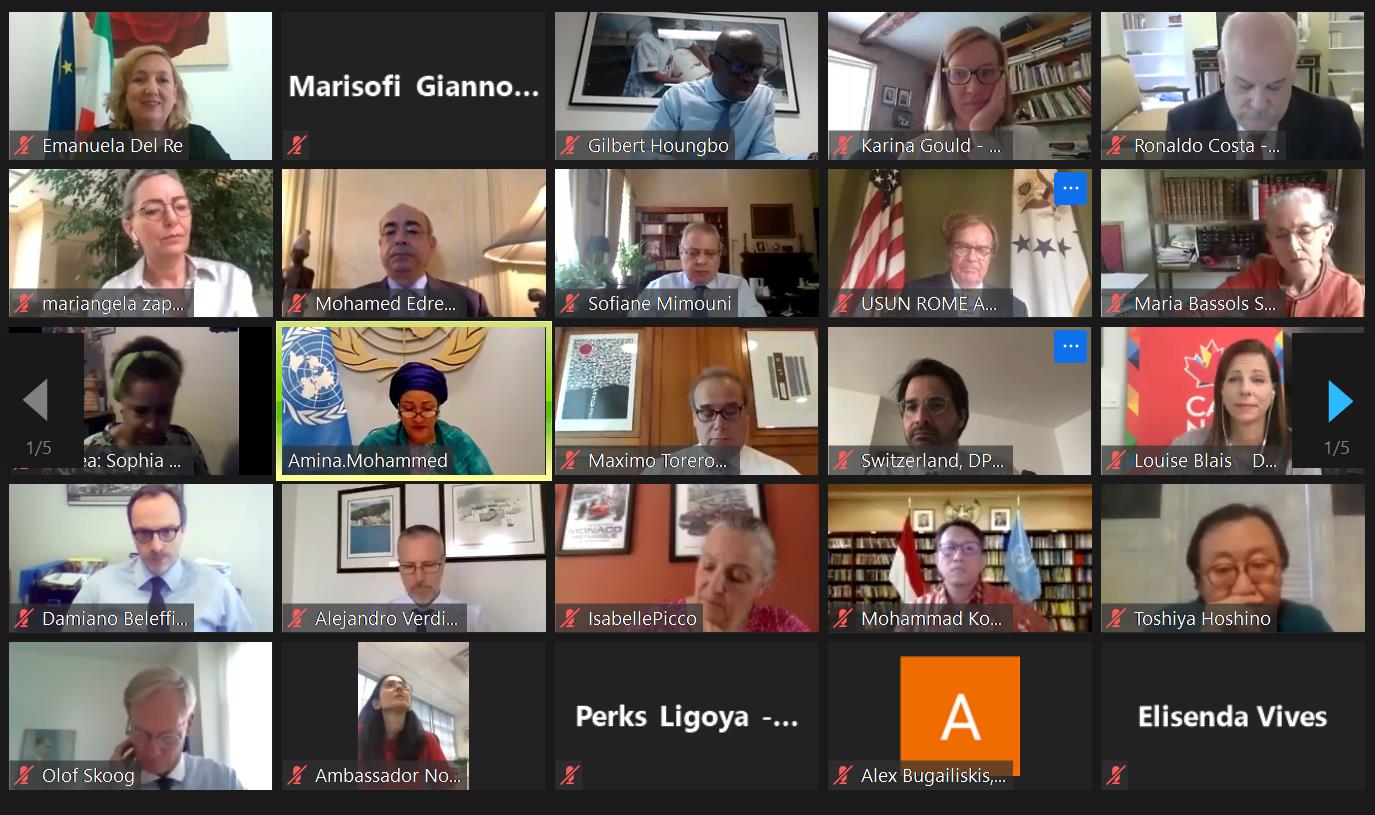Sustainable agriculture as a tool to avoid a COVID-19 food crisis

The Group of Friends of Food Security and Nutrition hosted a virtual high-level meeting to discuss the findings of the Secretary General’s Policy Brief on The Impact of COVID-19 on Food Security and Nutrition. The brief forms part of a series that lays out a vision for how the international community can deliver an effective and coordinated response to COVID-19 by providing Member States with concrete ideas for how to address the consequences and even seize opportunities in the midst of the pandemic.
Chairing the Group of Friends of Food Security and Nutrition, the Vice Minister of Foreign Affairs of Italy, Emanuela Claudia Del Re opened the event by urging all parties “to intensify efforts, so that we can ensure that the global health crisis does not become a global food crisis.” Del Re also pointed to the 2021 Food Systems Summit as a key moment for mobilizing efforts to achieve Zero Hunger.
In her opening remarks, Deputy Secretary-General Amina Mohammed stated that “accelerated investment in food systems transformation should be a pillar of the COVID-19 response”. Mohammed also noted that while the Sustainable Development Goals are the blueprint for building back better, food systems represent a key tool to this end.
“Nutrition and adequate food are key to building immunity and resisting disease,” said Minister of International Development of Canada, Karina Gould, while explaining how a robust food system will help countries rebound from the COVID-19 crisis. The Minister also announced Canada’s commitment to mitigating the impacts of COVID-19 on agriculture, food security, and nutrition in developing countries.
The Vice-Minister for Trade and International Relations of the Ministry of Agriculture, Livestock and Supply of Brazil, Orlando Leite Ribeiro, noted the important messages and recommendations for more resilient and sustainable food systems in the Secretary-General’s policy brief. He also underlined that “trade corridors and agricultural supply chains need to be kept open and functioning”.
The Deputy Assistant Foreign Minister of the Ministry of Foreign Affairs of Egypt, Seif Kandeel, indicated that the pandemic could create a long-term global humanitarian developmental crisis, with rising unemployment, rising food prices and decreased income. “To avert this compounded crisis, a global preemptive call to action is required, which should include stimulus packages to Africa, as well as increased investment in agriculture and improving market access to nutrition,” said Kandeel.
The President of the International Fund for Agricultural Development (IFAD), Gilbert Houngbo, discussed some of the overlooked challenges of the pandemic, including the fact that most packages have not been designed to reach smallholder farmers. “Smallholder farmers borrowing from microcredit institutions are having trouble paying on loans, and the decline in remittances is posing significant burden to food security in terms of production and consumption,” noted Houngbo.
His concerns were echoed by the Food and Agriculture Organization of the United Nations (FAO) Chief Economist, Maximo Torero, who called providing support to smallholder farmers and micro, small, and medium enterprises facing liquidity constraints between recession and recovery. “We need to create new market opportunities by accelerating intra-regional trade, and thereby generating new demand for food,” said Torero.
The Assistant Executive Director of the World Food Programme (WFP), Valerie Guarnieri, went on to further explain how the pandemic is resulting in a projected additional 130 million people facing acute food insecurity. Guarnieri also referred to WFP’s support for common services and logistics on behalf of the humanitarian community, with eight COVID-19 response hubs which are fully operational.
The event was concluded with remarks by the Special Envoy for the 2021 Food Systems Summit, Agnes Kalibata, who underscored the value of the upcoming summit as an opportunity for inclusive dialogue. “We want the world to hold us accountable for the progress people want to see,” said Kalibata, also asking for the commitment of communities, countries, civil society, and private sector alike. Currently, a number of work streams have been put in place for the summit, focusing on nutrition, reducing hunger, net zero emissions, reducing loss and waste and improving livelihoods.
The Impact of COVID-19 on Food Security and Nutrition was penned by FAO, in collaboration with the WFP, IFAD, the United Nations Children's Fund, and the World Health Organization. More information on the launch of the brief is available here.
